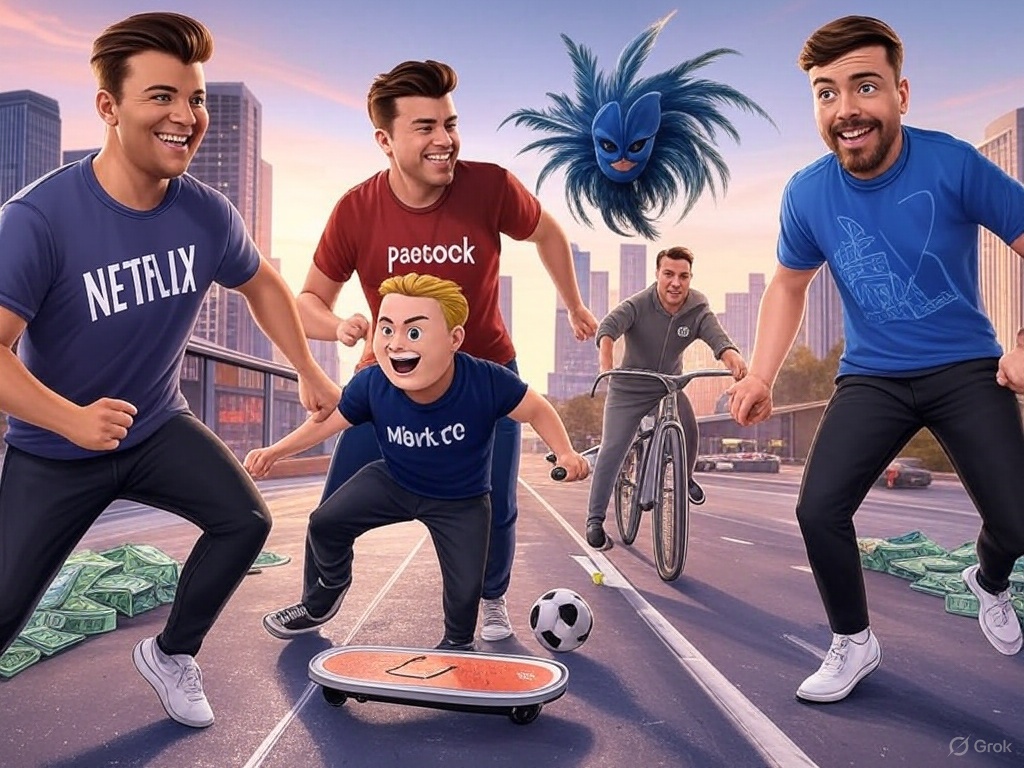The success of Beast Games on Amazon Prime, which raked in $100 million in profit, has ignited a fierce race among streaming giants to sign top YouTube creators.
Netflix, Peacock, and Disney are diving headfirst into the creator economy, eager to leverage the massive audiences and unique appeal of digital stars. As traditional platforms pivot to compete with YouTube’s dominance, the stakes—and budgets—are higher than ever.
Netflix’s Big Bet on YouTube Talent
 Netflix is leading the charge, already securing a deal with Ms. Rachel, a YouTube sensation known for her children’s content.
Netflix is leading the charge, already securing a deal with Ms. Rachel, a YouTube sensation known for her children’s content.
Since its debut in late January, her show has consistently ranked in Netflix’s top 10, proving the platform’s knack for tapping into digital audiences.
Now, Netflix is eyeing bigger fish: Dude Perfect, the sports and comedy collective, and Mark Rober, a former NASA engineer turned YouTube science guru. While details on Dude Perfect’s potential deal remain scarce, Rober’s negotiations have hit a snag.
Rober’s income heavily relies on his subscription-based engineering kits, a revenue stream that clashes with Netflix’s strict limits on in-show advertising and product integrations. Unless Netflix bends its rules, Rober might turn to Amazon, where creators enjoy greater freedom to monetize through e-commerce. Amazon’s relaxed approach makes it a haven for creators with their own product lines, giving it a distinct edge in this talent tug-of-war.
Disney and Peacock Join the Fray
 Disney is also in the game, scouring the creator landscape for family-friendly YouTubers to bolster its content slate. Meanwhile, NBCUniversal’s Peacock is making bold moves, planning to launch four comedy shows this year developed by digital talents scouted through its dedicated program.
Disney is also in the game, scouring the creator landscape for family-friendly YouTubers to bolster its content slate. Meanwhile, NBCUniversal’s Peacock is making bold moves, planning to launch four comedy shows this year developed by digital talents scouted through its dedicated program.
These platforms are betting that YouTube creators can bring fresh, authentic voices—and their loyal fanbases—to their ecosystems.
MrBeast Keeps Raising the Bar
While streaming giants scramble to integrate YouTube stars, MrBeast remains a step ahead. Fresh off the success of Beast Games, he’s already announced a casting call for the second season via Instagram, promising a jaw-dropping $15 million prize pool.
His ability to independently produce blockbuster content underscores why platforms are so eager to partner with creators of his caliber.
The Creator Economy Meets Hollywood
 The rush to sign YouTube stars signals a broader shift in entertainment. Streaming platforms recognize that creators bring not just content but built-in audiences, often dwarfing those of traditional celebrities. H
The rush to sign YouTube stars signals a broader shift in entertainment. Streaming platforms recognize that creators bring not just content but built-in audiences, often dwarfing those of traditional celebrities. H
owever, integrating these digital natives into structured ecosystems poses challenges. Creators like Rober, whose businesses extend beyond content, need flexibility that platforms like Netflix may struggle to provide. Amazon’s creator-friendly model could give it an advantage, while Disney and Peacock are banking on niche appeal to carve out their own slices of the creator pie.
As the battle for creators intensifies, one thing is clear: YouTube stars are no longer just internet personalities— they’re the new powerhouses of entertainment, and streaming giants are ready to fight for their spotlight.






